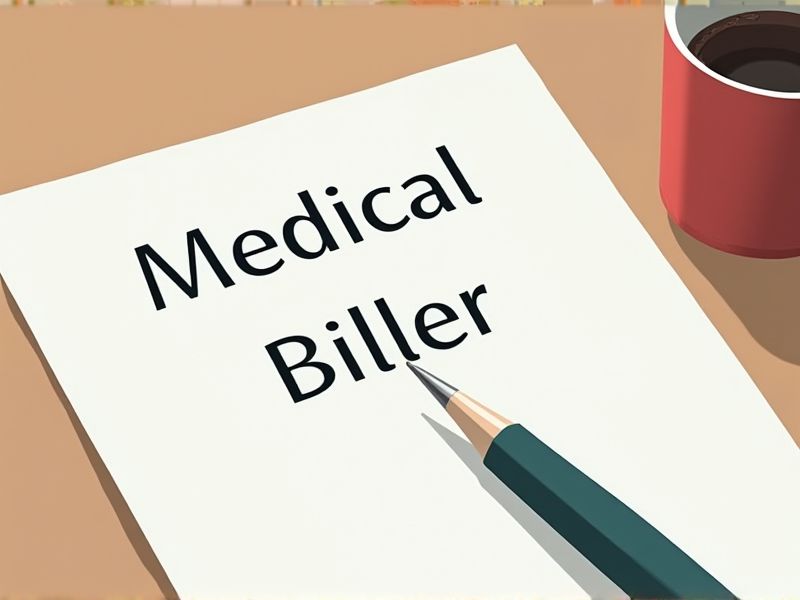
Medical Billers handle intricate healthcare billing processes that require a deep understanding of medical coding and insurance policies. Certifications validate their competency, ensuring accuracy and compliance with healthcare regulations. Employers often seek certified professionals to minimize errors and streamline revenue cycle management. Essential certifications for a Medical Biller include CPC, CPB, and CHCS.
Certified Professional Biller (CPB)
A Certified Professional Biller (CPB) possesses the expertise to accurately navigate complex medical codes and ensure correct claim submissions, reducing the likelihood of claim denials and increasing revenue efficiency. Employers recognize CPB certification as a standard for proficiency, which can enhance job prospects and career advancement opportunities for medical billers. The CPB certification includes rigorous training on healthcare regulations, ensuring billers remain compliant with evolving laws and ethical standards. With a CPB, medical billers are better equipped to handle patient billing inquiries, resulting in improved patient satisfaction and smoother healthcare operations.
Certified Medical Reimbursement Specialist (CMRS)
Employing a Certified Medical Reimbursement Specialist enhances a medical biller's ability to navigate complex billing systems and insurance processes, minimizing errors. Certification ensures a medical biller is up-to-date with the latest regulations, which helps maintain compliance with healthcare laws. It instills confidence in healthcare providers regarding accurate billing and efficient reimbursement. Having a CMRS can lead to faster claims processing, improving cash flow for medical practices.
Certified Professional Coder (CPC)
A Certified Professional Coder (CPC) ensures accurate translation of medical services into universal codes, which directly impacts billing accuracy. Accurate coding reduces claim denials, leading to quicker reimbursement and improved cash flow for healthcare facilities. CPCs possess specialized knowledge of coding guidelines and regulations, which minimizes legal issues related to billing fraud or abuse. Employing a CPC can enhance the overall efficiency of medical billing processes, boosting both patient satisfaction and institutional credibility.
Certified Coding Associate (CCA)
The CCA credential demonstrates a baseline knowledge in health information management, indicating that a medical biller possesses essential skills in coding practices. Employers recognize CCAs as having the ability to accurately translate patient information into codes, reducing the risk of billing errors. Certified billers often streamline the reimbursement process, which positively impacts a clinic's financial health. The credential can also lead to increased job opportunities and potential for higher salaries in a competitive healthcare environment.
Certified Revenue Cycle Representative (CRCR)
The CRCR designation helps a medical biller effectively manage revenue cycle tasks by providing specialized knowledge and skills. It equips billing professionals with a deeper understanding of financial, compliance, and operational aspects, leading to fewer errors. Having CRCR certification can result in improved reimbursement rates for healthcare providers due to more accurate billing processes. Employers may prefer CRCR-certified billers as it demonstrates a commitment to maintaining industry standards and professional growth.
Certified Healthcare Financial Professional (CHFP)
A Certified Healthcare Financial Professional (CHFP) credential equips medical billers with a comprehensive understanding of financial management in healthcare, aligning their expertise with industry standards. This certification enhances a biller's ability to navigate complex financial systems, ensuring that billing practices adhere to regulatory requirements and optimize revenue cycle processes. The CHFP designation signals credibility, increasing trust from employers and clients, which can lead to career advancement opportunities. As healthcare financial management evolves, the CHFP ensures professionals remain current with changes, allowing billers to contribute effectively to organizational success.
Certified Medical Office Manager (CMOM)
A Certified Medical Office Manager (CMOM) ensures the billing process aligns with regulatory compliance, reducing the risk of costly audits and penalties. Expertise in CMOM promotes efficient workflow management, enhancing the accuracy and speed of billing operations. CMOM provides advanced knowledge in revenue management, optimizing reimbursement processes for healthcare providers. Their skills in managing patient records and financials support transparent communication between medical billers and insurance companies.
Certified Documentation Improvement Practitioner (CDIP)
Certified Documentation Improvement Practitioners (CDIP) enhance medical billing accuracy by ensuring the complete and precise documentation of patient records, which is crucial for correct billing and reimbursement. When documentation is improved, it minimizes coding errors that can lead to claim denials, saving both time and resources for medical billing departments. CDIP professionals aid in compliance with regulatory standards, reducing the risk of audits and financial penalties for healthcare providers. Their expertise supports efficient revenue cycle management, resulting in more predictable cash flow for the medical practice.
Certified Patient Account Specialist (CPAS)
Employing a Certified Patient Account Specialist ensures accuracy in billing, significantly reducing the risk of financial discrepancies. This certification equips professionals with a comprehensive understanding of healthcare regulations, improving compliance with industry standards. The proficiency gained through CPAS training enhances communication with insurance companies, facilitating quicker claim approvals. Medical facilities experience improved financial performance as CPAS holders streamline revenue cycle management.
Certified Healthcare Compliance Professional (CHCP)
A Certified Healthcare Compliance Professional (CHCP) ensures adherence to healthcare laws, which minimizes the risk of legal issues related to billing. Compliance knowledge aids medical billers in accurately processing claims and avoiding costly errors. The CHCP credential can enhance the reputation of medical facilities by demonstrating a commitment to ethical practices. Proper compliance training can lead to more efficient billing operations, decreasing claim denials and improving revenue cycle management.
Summary
When you obtain certifications in medical billing, you often enhance your credibility and increase your job prospects in the healthcare industry. These certifications can lead to higher salary potential due to recognized expertise. Employers tend to prefer certified billers, which can give you an advantage in competitive job markets. Your knowledge in coding and compliance also tends to improve, reducing billing errors and improving efficiency.
